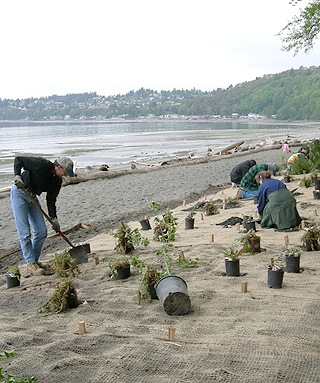
Anchor Environmental
Specialty: Cleanup of contaminated sediments, shoreline restoration and development
Management: Seattle office managing partner Tom Schadt; Seattle office partners Ed Berschinksi, Jon Boyce, Bob Montgomery, Clay Patmont, David Templeton, John Verduin, Tom Wang
Founded: 1997
Headquarters: Seattle, with 12 offices around the U.S.
2006 revenues: $18 million
Projected 2007 revenues: $22 million
Current projects: Sediment cleanup on the East Waterway Superfund site for the Port of Seattle; sediment cleanup and park development for the city of Gig Harbor’s Eddon Boatyard; habitat restoration for the Chelan County Public Utility District; master plan, beach restoration and park improvements for the city of Burien’s Seahurst Park; sediment cleanup on the Lower Willamette Superfund site for the Port of Portland, Northwest Natural and the Lower Willamette Group

Photo courtesy of Anchor Environmental Anchor Environmental employees helped restore the beach and make other improvements to Seahurst Park in Burien.
|
Anchor partner David Templeton is excited that cleanup of Puget Sound is finally picking up speed, thanks to record revenues to the state toxics account and the efforts of the Puget Sound Partnership.
“We think we’ll see a lot more projects move faster to cleanup status,” Templeton said.
Which means more work for Anchor Environmental, whose core business is cleaning up contaminated sediments.
Port cleanups
The company’s client base includes several Northwest ports which are reclaiming polluted industrial lands, including the ports of Seattle, Tacoma, Bellingham, Portland and Vancouver.
And Washington is not the only state which is stepping up its cleanup efforts, Templeton said. He’s seen the same trend in New York, Wisconsin, California and the Gulf Coast — all places where Anchor Environmental has offices.
“The public is still very interested and motivated to get the environment cleaned up,” Templeton said. “It’s been good for us.”
A narrow focus
Anchor’s focus is so narrow, the company sometimes finds it challenging to hire the right people. “We’re fine-tuning an already limited workforce,” Templeton said, explaining that Anchor’s engineers and environmental scientists have to have experience on waterfront projects.
But technologies like e-mail and voice mail have given the company’s employees much more personal freedom, he said. It’s no longer important for them to all be in the same office.
“If we have people who choose to live in Bellingham, they can still work on projects on a national basis,” said Templeton. “That’s a trend change for us.”